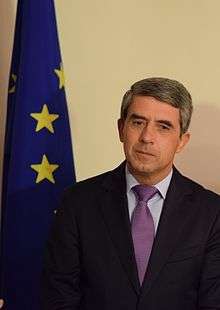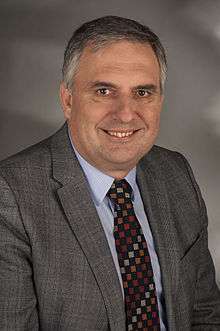Bulgarian presidential election, 2011
| | |||||||||||||||||||||||||||||||||
| |||||||||||||||||||||||||||||||||
| |||||||||||||||||||||||||||||||||
| |||||||||||||||||||||||||||||||||
A presidential election was held in Bulgaria on 23 October 2011, with a runoff held on 30 October 2011. No candidate won outright in the first round, resulting in a second round runoff between the eventual winner, Rosen Plevneliev of GERB, and Ivaylo Kalfin of the Bulgarian Socialist Party.[1]
Candidates
There are 18 registered candidates.[2] Rosen Plevneliev, Ivaylo Kalfin, and Meglena Kuneva were expected to have the best chance of reaching the second round.[3] The candidates are:[4]
| Party | Presidential candidate | Vice presidential candidate |
|---|---|---|
| Blue Coalition | Rumen Hristov | Emmanuel Yordanov |
| Bulgarian Agrarian National Union | Nikolay Nenchev | Zheko Ivanov |
| Bulgarian Democratic Unity | Andrey Chorbanov | Angel Mirchev |
| Bulgarian Socialist Party | Ivaylo Kalfin | Former Culture Minister Stefan Danailov |
| GERB | Rosen Plevneliev | Justice Minister Margarita Popova |
| IMRO – Bulgarian National Movement | Krasimir Karakachanov | Daniela Dimitrova |
| Initiative committee | Meglena Kuneva | Lyubomir Hristov |
| Initiative committee | Dimitar Kutsarov | Kamelia Todorova |
| Initiative committee | Aleksey Petrov | Nikolai Georgiev |
| Initiative committee | Nikolay Vassilev | Vladimir Savov |
| Initiative committee | Svetoslav Vitkov | Ventsislav Mitsov |
| Initiative committee | Ventsislav Yosifov | Vladimir Slavov |
| National Front for Salvation of Bulgaria | Stefan Solakov | Galina Vasileva |
| National Movement Unity | Sali Ibrayim | Valentina Gotseva |
| Attack | Volen Siderov | Pavel Shopov |
| Order, Law and Justice | Atanas Semov | Polya Stancheva |
| Party for the People of the Nation | Pavel Chernev | Anelia Dimitrova |
| United People's Party | Maria Kapon | Nikolay Kisyov |
Results
| Candidate | Party | First round | Second round | ||
|---|---|---|---|---|---|
| Votes | % | Votes | % | ||
| Rosen Plevneliev | GERB | 1,349,380 | 40.11 | 1,698,136 | 52.58 |
| Ivaylo Kalfin | Bulgarian Socialist Party | 974,300 | 28.96 | 1,531,193 | 47.42 |
| Meglena Kuneva | Initiative committee | 470,808 | 14.00 | ||
| Volen Siderov | Attack | 122,466 | 3.64 | ||
| Stefan Solakov | National Front for Salvation of Bulgaria | 84,205 | 2.50 | ||
| Rumen Hristov | Union of Democratic Forces | 65,761 | 1.95 | ||
| Atanas Semov | Order, Law and Justice | 61,797 | 1.84 | ||
| Svetoslav Vitkov | Initiative committee | 54,125 | 1.61 | ||
| Sali Ibrayim | National Movement Unity | 41,837 | 1.24 | ||
| Krasimir Karakachanov | IMRO – Bulgarian National Movement | 33,236 | 0.99 | ||
| Aleksey Petrov | Initiative committee | 31,613 | 0.94 | ||
| Maria Kapon | United People's Party | 30,665 | 0.91 | ||
| Nikolay Nenchev | Bulgarian Agrarian National Union | 9,827 | 0.29 | ||
| Pavel Chernev | Party for the People of the Nation | 8,081 | 0.24 | ||
| Ventsislav Yosifov | Initiative committee | 7,021 | 0.21 | ||
| Dimitar Kutsarov | Initiative committee | 6,989 | 0.21 | ||
| Andrey Chorbanov | Bulgarian Democratic Unity | 6,340 | 0.19 | ||
| Nikolay Vasilev | Initiative committee | 5,633 | 0.17 | ||
| Total valid votes | 3,364,084 | 100 | 3,229,329 | 100 | |
| Invalid/blank votes | 229,844 | 6.40 | 104,837 | 3.14 | |
| Votes cast | 3,593,928 | 100 | 3,334,166 | 100 | |
| Registered voters/turnout | 6,873,589 | 52.29 | 6,910,491 | 48.25 | |
| Source: Electoral Commission of Bulgaria | |||||
Two in one elections
The presidential elections were held in conjunction with local elections, saving the country BGN 8 million according to the finance minister Simeon Djankov.[5] The move to have "2 in 1" elections drew criticism from the US Ambassador in Sofia, James Warlick, who said that the move led to poor administration during the elections.[6]
Controversies
MPs interfering with the ballot count
Two GERB MPs were photographed at the Sofia electoral commission amid the chaos that erupted at the Sofia commission right after the first round of presidential and local elections.[7] These two MPs were not authorized to be present at the electoral commission at that time: an offence under Bulgarian law. One of the GERB MPs, Stanislav Ivanov, was photographed carrying a large bag around the Sofia Electoral Commission building. This bag was presumably full of ballots.[7] The Central Electoral Commission held a meeting on the case but failed to reach a decision, because voting could not reach the required 2/3 majority.[7]
Universiada Hall crisis
Members of electoral committees were held without rest or sleep for 30 to 34 hours. Universiada Hall was not aired, was stunningly cold and members of committees were not given food and water, and not allowed to go outside the Hall to buy such. Journalists and observers were not allowed in Universiada Hall and a large region around it was slipped off with police until the next day late afternoon and early evening.
In the day of the elections and day after one member of Municipal Committee in Varna died, six ambulances arrived at Universiada Hall to assist fainted committee members, while the number of fainted man and women, and those suffering health problems during and after elections is not known, according to witnesses people were fainting in the Hall and at the queues for delivering elections protocols, and in the first lines at the committee members meeting in Universiada people were in constant fainted and wakening cycles condition because of lack of air, cold, malnutrition and exhausture.[8]
People slept on floor, on bags with bulletins and even some left Universiada Hall unlawfully with taking the bulletins with themselves at home because of the poor conditions.
In the first announcement of the situation no politician or Central Committee member expressed any sorry or apology for it and party GERB said that the reason of this was the one-hour delay of the starting of the electoral day but in fact the starting of the electoral day was marked by no voters in the first 2 hours, while people was arriving at sections to vote around 8 am.
After the scandal of the situation of people still at Universiada Hall sparked in media, it was announced that committee members held there will receive 60 lv or 30 Euro more as a compensation for the long hours stay.
International statements
The PACE delegation noted that whilst the election was conducted in a generally orderly and peaceful way, there remained concerns about a lack of an equal access to the media, blurred distinctions between newspaper editorials and political advertisements, the lack of a dedicated voter roll and the candidate registration system which particularly affected independent candidates. PACE also recommended that voting for expatriate Bulgarians should be improved.[9] The OCSE delegation also noted concerns about the blurred lines in media coverage, as well as vote-buying allegations, restrictions on using minority languages in campaigns, and inflammatory statements by some candidates.[10]
References
- ↑ Bulgarian ruling party candidate leads in presidential vote Archived October 26, 2011, at the Wayback Machine. Business Week, 24 October 2011
- ↑ Candidate lists for President and Vice President of the Republic of Bulgaria Electoral Commission of Bulgaria (Bulgarian)
- ↑ Leading MEP runs for Bulgarian presidency Archived July 22, 2011, at the Wayback Machine. Eurative, 19 July 2011
- ↑ GERB's Plevneliev has narrow lead in tight presidential race - poll The Sofia Echo, 18 September 2011
- ↑ "Bulgaria's '2 in 1' Elections Spared BGN 8 M - FinMin". Novinite.com. Sofia News Agency. Retrieved 2 June 2014.
- ↑ "US Ambassador: Elections in Bulgaria Were Not Administered Well". Novinite.com. Sofia News Agency. Retrieved 2 June 2014.
- 1 2 3 "Bulgaria Election Body Fails to Censure Ruling Party MPs for Interfering with Elections". Novinite.com. Sofia News Agency. Retrieved 20 February 2014.
- ↑ Video was broadcast in Bulgarian televisions where at the meeting of committee members in Universiada people are scanning 'mafia' because of the conditions Universiada Hall - BGNES, elections 2011 (video), YouTube, October 24, 2011. Retrieved 2011-10-26
- ↑ Bulgaria’s 2011 elections efficiently run, but with shortcomings – PACE The Sofia Echo, 24 October 2011
- ↑ OSCE positive about Bulgarian election but worried by vote-buying, media coverage The Sofia Echo, 25 October 2011
External links
- NSD: European Election Database - Bulgaria publishes regional level election data; allows for comparisons of election results, 1990-2011

